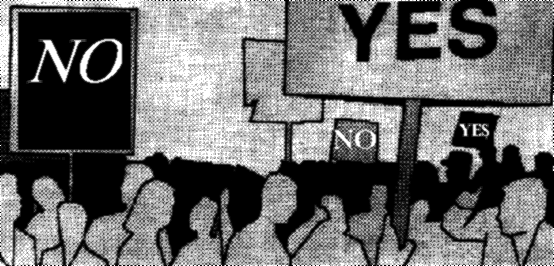

Much too simple!
A mechanical logic like Aristotle's may work fine in programming computers, or in schoolbook schemes of symbolic logic, But, in real life we all know very well that things are never that simple. Every real question has two sides to it.


Plato suggested that truth was to be found in the clash of opposing ideas. In the 19th century of our era, Hegel formulated a philosophical theory that suggested that EVERYTHING was in a kind of spiritual dialectic, where the ideal qualities of every person, thing or idea could be described as dual and contrasting. Sugar was both sweet (if eaten in moderation) and non-sweet (if you "pig-out" on it and get sick). Green was both green and non-green (i.e. a mix of yellow and blue!), and a good person can never be regarded as COMPLETELY good, nor a bad person as UTTERLY bad. And, just as importantly, nothing ever STAYS the same forever--a generally good person may become or do bad, green may fade to brown or white or yellow, sugar may burn or ferment, and everything is in the process of becoming something else altogether. This forms a kind of "law of universal motion" or change.
Hegel described the dialectical process this way:
1. THESIS--This is the first idea or state (of mind or thought) that you start with. Then comes
2. ANTITHESIS--an opposing idea, or state of mind. Thesis and antithesis disagree, or contradict with each other. From that clash comes the
3. SYNTHESIS--a brand new idea, thought, or state of mind.
Remember, according to Hegel, this was all taking place purely in the realm of mind, thought, spirit or ideas.
***NOT AN OFFICIAL UTEP INSTITUTIONAL WEBSITE***
Views expressed on this website do not necessarily reflect the opinions of
Views expressed on this website do not necessarily reflect the opinions of UTEP, its agents, administration, regents, faculty or staff.
graduate school, administration, regents, faculty or staff.
| Owen M. Williamson - Education Bldg 211E - phone: (915) 747 7625 - fax: (915) 747 5655 |
| The University of Texas at El Paso - 500 W. University Ave. - El Paso, TX 79968 |
| Important Disclaimer |

Open Courseware | OCW |This work is dedicated to the Public Domain..